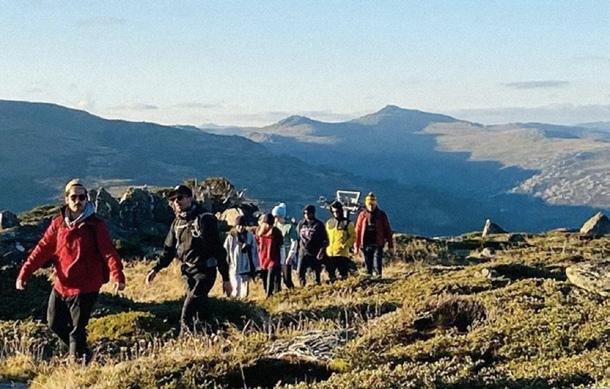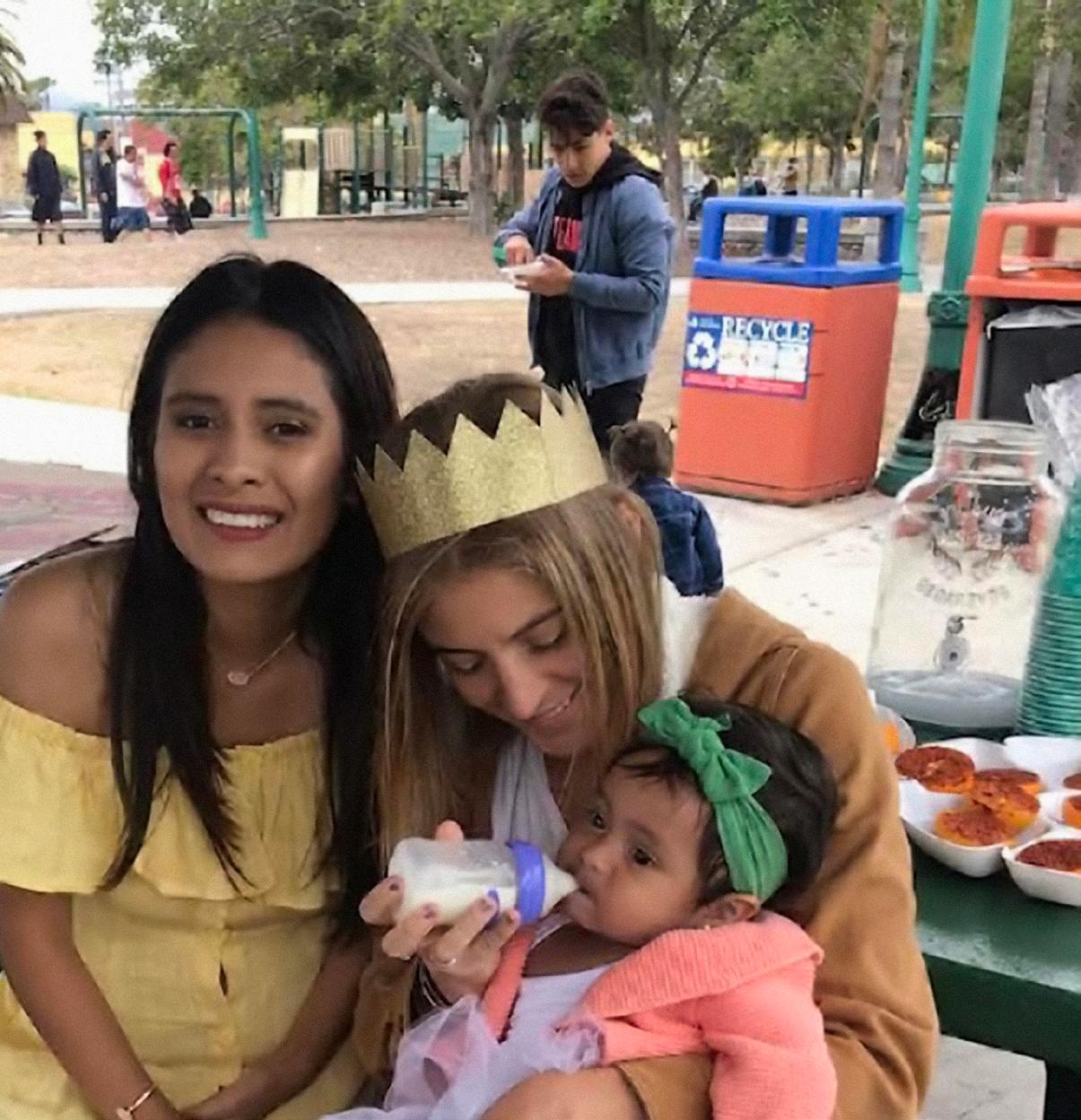RELATIONSHIPS
HOW TO TALK TO GEN Z

Countering the messages they’re hearing with the good news.
THE NEW ALCOHOL
How social media is affecting students and what to do about it.
SPRING 2023 / EDITION 001 THE JOURNAL KIDS. CULTURE. JESUS.
WE ARE LOOKING FOR CANDIDATES WHO EMBODY YOUNG LIFE TO SERVE AT CAMP.

YOUNGLIFE.ORG/SUMMERSTAFFAPP
OR SHARE WITH SOMEONE YOU KNOW TO HELP KIDS HAVE AN UNFORGETTABLE WEEK.
APPLICATIONS NOW OPEN | SUMMER 2023
APPLY TODAY




CONTENTS 05 08 12 18 IN THIS ISSUE If you’re receiving duplicate copies or would like to switch over to the electronic version, please contact the Young Life Mission Assistance team at assistance@sc.younglife.org. We can also help you with the change of address or giving information. Young Life is a Charter Member of the Evangelical Council for Financial Accountability. 04 From the President 05 Kids in Culture: More Than Music 06 Global Dispatches: Snapshots from Around the World 08 The Race for One 12 How to Talk to Gen Z 16 In Their Own Words: A Day Like No Other 18 Technology: The New Alcohol 20 Club in a Bomb Shelter and Other Accounts from Ukraine 22 The Last Word: The Big Dream Publisher/President Newt Crenshaw Executive Editors Lauren Bocci Gabe Knipp Senior Editor Jeff Chesemore Coordinator Michael Swyers Copy Editor Jessica Williams Art Director Isaac Watkins Designers Liz Knepper Kristen Ward Diné Wiedey On The Cover Dahlia is a high school senior in Colorado Springs, Colorado. She loves her Young Life community and the memories she’s made this past year. The Relationships Journal 3
FROM THE PRESIDENT
Friends,
You have probably heard the adage: the church is always one generation from extinction. We see and feel this — in statistics about young people staying home on Sundays or refusing to open their Bibles. We see it in the way kids are on social media and hearing conflicting messages every time they pick up their phones.
How do we get the stunningly good news of the gospel to a generation distracted by Instagram and TikTok?
We begin by listening. Nothing is so imperative today. God begins in the same place. In his classic book, Reversed Thunder , Eugene Peterson wrote, “The world is a mob in which everyone is talking at once and no one is willing or able to listen. But God listens … When [this] happens we know that what we say and feel are immensely important. We acquire dignity.”
We show the next generation what God is like when we listen — without prejudice or agenda. We listen to young people’s hopes and fears, their anxieties and aspirations. This issue of The Relationships Journal is meant to tune our ears to hear what young people, or Gen Z, are hearing.
You may have noticed a new title and different feel for this magazine. We are still all about relationships. But we want to give you a closer view of kids today, what culture is telling them, and where we see Jesus in the midst of it. We want to get to ground level, with the intimacy and urgency of a journal.
We want to listen.
And if you’ve opened this magazine, you are someone who has already said, “I want to listen, too.” I hope you hear the words of young people today in these pages. Even more, I hope these pages drive you to an actual young person — whether son or granddaughter, your barista when you get your coffee, the car next to you playing music too loudly. Young people are saying something.
Are we listening?
In Young Life, we often call “listening” part of “earning the right to be heard.” You are part of a movement of people earning that right, part of a movement of people listening. In doing so, we all are part of God’s movement of people ready to be heard — and share the stunningly good news of the gospel to young people desperate for it.
Let’s start by listening.
Newt

To see bonus content, scan this QR Code. 4 The Relationships Journal
More Than Music
Few things create a deeper divide between generations than music. From Elvis to Beyoncé, parents have complained for decades about the lyrics, beat or volume coming from their teen’s room. But what might happen if we tried instead to step into the space today’s teen inhabits?
Imagine if, when you were a teenager, a caring adult asked why certain music resonated with you? Or what if they asked why your favorite artist was so special?
Taylor Swift is many kids’ favorite artist and arguably one of the biggest stars in music today. Her latest album, Midnights, continues to make history. The fastestselling album of her career made Taylor the first artist in history to capture the top 10 spots on the U.S. Billboard Hot 100 Chart. In 2022, she had 36.6 billion combined streams of her music. Both teens and adults connect with her on a deep level, many devotedly waiting online for days to get concert tickets. What draws fans to Taylor and her music?
This question applies to music across the board. Because music, inherently, is a window into the soul — sometimes speaking for an entire generation. What we’re listening to tells us what we care about, what we’re feeling and the way we see the world. What if we ask teens questions like, “What about this song resonates with you? Why do you like (artist) so much?”
From here we can consider, “What does this tell me about their heart and what teenagers today are encountering?” Lean in and meet them where they are, even if their favorite genre embodies your worst nightmare.
We want kids to know we care, and that starts with being interested in what they care about. Whether it’s Billie Eilish, Harry Styles, Kendrick Lamar or someone else, curiosity about their musical influences can help start a dialogue. Here are some approaches:
• Casually ask your teen what song he just listened to; then ask him to look up those lyrics and discuss them with you.
• Talk about the redeeming themes in the song, like love or forgiveness.
• If there are sexual, vulgar or violent references, use these as a springboard for another conversation.
These questions help us walk with the Gen Z teens in our lives as they learn how to discern musical influences.
In Young Life, we go where kids are — which includes their musical interests. Let’s come alongside them and start conversations about what they’re hearing. Knowing when we ask, “What’s going on in that song?” we’re also asking, “What’s going on in your soul?”

KIDS IN CULTURE
We want kids to know we care, and that starts with being interested in what they care about.
The Relationships Journal 5
HOW SONGS SHOW US KIDS’ HEARTS.
Snapshots from Around the World
MADE POSSIBLE BY PEOPLE LIKE YOU.
Australia
NEW SEEDS OF MISSION
Young Life University held their first camping weekend in 2022. This new ministry is growing steadily, as God has planted new seeds and a team of staff, volunteers and donors get to watch them grow.

Cambodia
CELEBRATING GOD’S WORK
The gospel has been made known in Cambodia for 100 years and tens of thousands of believers came together to celebrate over two days in January 2023.
Many Young Life staff, volunteers and kids joined in the largest local Christian event to date.

GLOBAL DISPATCHES
6 The Relationships Journal
Ecuador
MIRACLE FOOTHOLD
Jhon is from one of the most dangerous neighborhoods in the country (El Guasmo in Guayaquil). He came to a Young Life Bible study and asked a leader, “When are you going to teach me to pray?” A few weeks later, he had his answer. At camp in Milagro, Jhon gave his life to Christ.
Nigeria

PAYING IT FORWARD
Marvelous had been bullied all her life — but experienced immediate love in her Young Life leader. She found new life at camp in 2018 and grew in her faith after — through Bible study and the influence of her leader. Three years later, Marvelous became a Young Life leader herself. Now, her siblings and her parents are helping Marvelous attend university, because they have seen the new life in her and want to see her rise to her potential.
Poland
10 YEARS OF MINISTRY
This year, the team in Poland has deepened their connection with the Catholic church and, through this partnership, run Confirmation Clubs in 13 different parishes around the country. Meanwhile, staff in Poland completed a fundraising program to help them raise money locally.


The Relationships Journal 7
THE RACE FOR ONE Y
Showing up for kids on the margins.
Abbey Fagan
oung Life ONE is focused on “the one.” The one kid who will be sleeping in a car. The one who will be moved to another foster home. The one lost in the sex-trafficking world. The one recently incarcerated.
The newest specialized ministry within Young Life, the people of Young Life ONE hear a call to let vulnerable youth know they belong, and that they’re loved, safe and can have a bright future.

Rachel Karman came on Young Life staff in 2015 with a focus on homeless youth in San Diego. An evident need for a ministry dedicated to vulnerable youth led to the official launch of Young Life ONE in 2020. Her growing team of staff and volunteer leaders are now in 46 areas across the United States — all with the same mission to tell “the one” about Jesus.
In Young Life, leaders earn the right to be heard.
In Young Life ONE, leaders simply earn the right to show up.
That’s what Rachel did for the entire first year. She kept
8 The Relationships Journal
building relationships with staff and students at Monarch School (San Diego, California), the first school in the U.S. dedicated to educating students impacted by homelessness. But doubts started rolling in. What was she doing? Would it ever make a difference?

Then she made a new friend — Genesis.
Genesis came face-to-face with homelessness during middle school when her single mom of four was evicted. Genesis eventually enrolled in Monarch School, and it was here in 2016 the high school student met Rachel.
“There was an immediate connection in my heart to Genesis,” Rachel says, “even before we built a relationship. I walked in the room and thought, There’s a girl I want to know .”
Their friendship slowly grew. Rachel showed up. They played card games like UNO. Rachel kept showing up, and they kept playing. One day, Rachel shared with Genesis about a Young Life camp called Woodleaf, and Genesis began recruiting friends from school to come to camp with her.
All week at camp the two continued to bond. On the last day of camp came a bombshell. The 17-year-old confided she was pregnant.
That moment at camp was the next step in an unexpected journey for the two friends. Despite sharing her secret, Genesis found Rachel continued to show up in her life.

Genesis remembers living in uncertainty, with a lack of stability and support surrounding her. “I was very scared because I wasn’t sure what I was going to do, but I knew Rachel was there with me.”
Rachel was there when they went to the clinic to get a positive pregnancy blood test. Rachel was there in the car saying, “Let’s pray,” as Genesis and her now fiancé, Josh, sat scared. Rachel was there along the way, checking in.
“I thought she was weird,” Genesis said. “Why would she be checking up on a homeless girl who didn’t have many people around her? Why does this person want to know how my doctor’s appointment was? What does she want?”
Rachel never stopped showing up.
She was in the delivery room when Viviana came into the world. Rachel was there when Genesis and Josh were in transitional housing at 19 years old. She was there when they separated for a time.
“During the dark times, I prayed to God to physically feel Him, and He sent Rachel,” Genesis said. “Anytime I needed a hug, she would just hug me. I felt His unconditional love through her. In our community, we were so caught up in, ‘Are we going to have food on the table? Are we going to have a home? What shelter are we going to be at tonight? Are my parents going to be there? Is there going to be a person that makes me feel unsafe?’ With all those thoughts running through my head and for Rachel to step in even just a little bit, I knew there was hope if there are people like her.”

“Doesn’t He leave the ninety-nine in the open country and go after the lost sheep until he finds it? And when he finds it, he joyfully puts it on his shoulders and goes home.”
— Luke 15:4-6a, NIV
The Relationships Journal 9
Genesis, Viviana and Rachel
STATISTICS:
• There are 2.5 MILLION YOUTH in the United States who are incarcerated, homeless, trafficked or in foster care.
• The average foster youth lives in 13 DIFFERENT HOMES before the age of 18.
• Within one year of being released, 55% OF INCARCERATED YOUTH will be arrested again.
• Within two years of aging out of foster care, 66% OF ADOLESCENTS are dead, homeless or in jail.
• AROUND 60% of child sex trafficking victims have been in the foster care system.
 * Stats taken from Chapin Hall’s Voices of Youth Count Study
* Stats taken from Chapin Hall’s Voices of Youth Count Study
10 The Relationships Journal
Genesis, Rachel and Emmy
Rachel was there when Viviana needed clothes, asking her “mom-friends” for help. She brought over three bags, and they had a photoshoot. With the clothes Genesis didn’t need, she gave them to other teen moms. Through no fault of her own Genesis lived in positions where she struggled; it was tempting to hold onto physical things given to her, but Genesis didn’t stop giving.
She continues to give. Genesis was a surrogate mother last year because she wants “to give everyone all the babies.” She started volunteering for her local YoungLives last year too, walking alongside other teen moms, celebrating and loving them where they are. She is now the one showing up like Rachel did for her. Genesis has two young daughters and an upcoming wedding (Rachel is the officiant), yet she continues to give her time and her love of Jesus to others.
The love Genesis and Rachel have for each other is undeniable. They see each other as family. Their families see

LESSONS
each other as family — as Genesis had been dying to see “who created this person that is Rachel?” Their families met in 2021.
The level of trust and respect they feel toward one another is proof of how God brings people together, people who might not have ever met if it wasn’t for games of UNO at Monarch School.
God longs for “the one” to know His unconditional and never-changing love for them. He’s used Rachel and Young Life ONE to remind Genesis of how He will always provide through the people she meets.
“Rachel has sparked this whole organization of Young Life into my life. I have people in different places who have offered their homes to us and another family offered their backyard for our wedding in June. They’re rooting for us. It’s cool to see people step into, not only my life, but my family’s. Even though we aren’t students anymore, people are still sticking by us.”
To learn more about Young Life ONE, visit younglifeone.org, or to support these efforts, scan this QR Code.
LESSONS WE CAN LEARN FROM VULNERABLE YOUTH LIKE GENESIS
These kids are everywhere.
There’s a strong chance kids like Genesis are in your neighborhood, town or city, but they blend in. It’s our job to develop the eyes to see and love them.
These kids are not all troublemakers.
Honestly, most are not. There’s a sweetness and sense of wisdom we can learn from kids who’ve seen more challenges than most have at their age.
Stay soft and kind in a world that is not.
The world can make us bitter because it’s often hard and unkind. But when kids find community and the love of Jesus, they’re free to become more empathetic and caring.
The Relationships Journal 11
how to talk to
TANITA MADDOX
Someone has to tell the grownups what’s happening to us.”
This was the plea of a high school sophomore who shared with me as we walked down a pathway at Washington Family Ranch – Canyon, a Young Life camp in Eastern Oregon.
That sentence has stuck with me: someone has to tell the grown-ups what’s happening to us.
She’s a member of Generation Z (Gen Z, born ≈1999-2015), which comprises the current world of adolescents. This generation is coming of age in a world of social media, frequent school shootings and a global pandemic — none of which existed




when many of us were teenagers. There is much I don’t understand about their experience. For a generation where 71% feel misunderstood by adults, being understood is a big deal.
Adolescents feeling misunderstood by adults and adults not “getting” adolescents is nothing new. However, this current divide is far deeper and wider than ever, and the ripple effects and consequences are dire.
In our journey to understand adolescents, let’s take a peek behind the curtain on three messages Gen Z adolescents are constantly receiving, and how we can enter the conversation with good news.

12 The Relationships Journal
MESSAGE #1: YOU ARE NOT ENOUGH (TO BE LOVED OR VALUED).
The previous generations’ circles of comparison were those in their own school, neighborhood and geography. With Gen Z comparison is global, made possible and accessible by the technology in their hands.

According to Dr. Jean Twenge, by 2015, race and socioeconomic differences did not have a measurable impact on social media use by Gen Z. This is evidence smartphones are eradicating an internet gap that once existed between social classes, both in the U.S. and around the world. Gen Z is a globally connected generation.

In a never-ending search to quench the need to be enough, there’s always
another achievement or accomplishment to attain. Social media feeds are filled with high-performing, elite peers, normalizing the impossible and unreachable. A simple search for filters on social media provides an abundance of options. I can find a filter that smooths my skin, adds makeup or changes the shape of my nose, lips or eyes. It’s a quick reminder: I don’t look the way I’m “supposed” to look. I am not enough. Add to this the words Gen Z hears about themselves in surround-sound from media and older generations around them. Ask a Gen Z-er in your life, “What do you hear about your generation?” They’ll respond quickly and clearly: fragile, weak, snowflake, over-emotional, over-sensitive and more.

The Relationships Journal 13
What if we spoke different words over this next generation?
What if we sought out how Gen Z reflects the image of God? What if the global-connectedness of Gen Z led to a global revival?

In my experience, not a single positive word comes up. They hear the message: I am not enough.
OUR OPPORTUNITY TO BRING GOOD NEWS:
What if we spoke different words over this next generation? What if we sought out how Gen Z reflects the image of God? What if the global-connectedness of Gen Z led to a global revival?
We get the opportunity to speak great vision into a great generation. They’re truth-seekers. They care for creation. They believe all people deserve dignity (as we would say, all people bear the Image of God). They’re positioned for global influence. Imagine what will happen when the Lord captivates the hearts of Gen Z.
And we get to tell them: you were always enough to be loved and valued by God. Romans 5:8 says, “But God demonstrates his own love for us in this: While we were still sinners, Christ died for us.” You were enough, not based on your achievements or failures, but on the simple fact God decided to show His love for you in this way. True freedom comes from our identity being found in Christ, not in the sum of our successes.
MESSAGE #2: THERE IS NO ROOM FOR ERROR.
In real time, adolescents can watch an idea being shared. And then they see this idea get commended, retweeted and celebrated, or called out, rebuked and canceled. They’re aware every word, picture, action or inaction incites response. They’ve seen an old photo or tweet unearthed from the past only to tarnish or destroy someone.
Culture demands perfection from Gen Z. With “cancel culture,” Gen Z knows they won’t only be publicly shamed, called out, yelled at and cast out for sharing the “wrong” opinion or thought, but also by simply asking the “wrong” question. Imagine being a teenager, too afraid to raise your hand and ask a question, because it could be met with hostility and outrage.
My most foolish moments are mostly forgotten legends, with likely no photographic or video evidence. This is not the case for Gen Z. They’re surrounded by cameras at all times. Pictures are shared instantly over the internet, videos are sent through social media and text messages are screenshot and posted. There’s no hiding, unless they go into total isolation. It’s no wonder anxiety and loneliness are prevalent, and why Gen Z needs accepting adults to enter into the world of kids.
OUR OPPORTUNITY TO BRING GOOD NEWS: What if we celebrated trial and error in addition to success? What if we paused to listen and process instead of instantly correcting or instructing? What if we shared our embarrassing failures, both past and present? We were not created for anxiety, but for peace. There is room for error under the umbrella of God’s

14 The Relationships Journal
grace. It’s about God’s perfection, not mine. In 2 Corinthians 12:9 Paul wrote, “But he said to me, ‘My grace is sufficient for you, for my power is made perfect in weakness.’ Therefore, I will boast all the more gladly about my weaknesses, so that Christ’s power may rest on me.”
Conviction is not the same as shame, and correction is not the same as canceling. We have the opportunity to offer a place where kids can learn and grow alongside caring adults who can help them cultivate maturity, part of which is learning how to try, fail and try again. Gen Z values authenticity, which means sharing the good and the bad, the ups and the downs, the successes and the failures. We can engage their value for authenticity by modeling authenticity.
MESSAGE #3: THERE IS ALWAYS A BETTER OPTION, SO DON’T COMMIT.

We all have different reasons for keeping our phones on the table during a coffee date: business, family, or time-sensitive needs.
When our Gen Z-ers keep their phones on the table, for many, it’s because it’s been drilled into them that if they’re not connected at all times, they’ll miss out. Gen Z is aware there’s always something better happening (or at least they feel like there is). Of course, we’re aware other things are happening in the world, but Gen Z adolescents watch it happen without them. They can see their friends hang out without them or watch an exciting event alone in their bedrooms.
This fear of missing out (FOMO) is a constant fear of making the “wrong decision” about where to be and how to spend one’s time. Marketers prey on this fear, encouraging businesses to utilize FOMO by creating time-sensitive content and deals that vanish. FOMO impedes commitment. Because authenticity (or what we would call integrity) is important to Gen Z-ers, they hesitate to commit knowing another option could arise. Gen Z wants its “Yes” to be “Yes” and “No” to be “No,” but they’re coming of age in a context that tells them they’re constantly making the wrong decision.
FOMO also says: You are not enough. If I sit across the table from you in conversation, and you immediately turn your eyes away with the chime and alert of your phone, you just communicated: there may be something better. You are not enough.
OUR OPPORTUNITY TO BRING GOOD NEWS:
What if we turned off technology and said aloud, “You are the best thing I can do with my time?” What if we taught Gen Z how to look for what God has for us in this moment? What does it look like to have peace despite knowing we are always missing out on something?
When our eyes are always looking for what’s next or what could have been, we’re in danger of missing what God is doing here and now. We can coach the
next generation to pause, look up and learn how to hear and see what Father, Son and Spirit are doing at any given moment. What’s the reason the Lord has you here, now, instead of somewhere else? This is a skill, cultivated over time, with the help of someone who has gone before us. There is so much pressure to make the right and perfect decision. Peace is in the fact that our imperfect decision-making process is in the hands of the perfect God.
CONCLUSION:
The older generations are always given the task to steward the next one — to teach them, prepare them, coach them and speak vision over them. This generation is looking for mentoring. It’s often one of the top criteria in choosing a career. We can show how an active and flourishing relationship with the triune God touches every part of our lives — an authentic, holistic, freedom-giving faith the next generation hungers for.

How will we steward Gen Z?
How will we speak vision into them?
Who is in front of you today whom you can mentor?
Tanita Maddox completed her Doctorate of Ministry at Phoenix Seminary. Her thesis was on sharing the gospel with Generation Z.
A Day Like No Other
What do you do when a Hall of Fame wide receiver calls you out of the blue and invites you to be his personal guest at an NFL game?
You say, “What time?!”
Young Life Capernaum is our ministry with kids with disabilities, and there are few places where it’s easier to see Jesus present than the interaction between a kid in Capernaum and their leader.

And, as part of the Seattle Seahawks
honoring perhaps their greatest-ever player, Steve Largent, in an on-field celebration, the legend made sure Young Life’s Capernaum of Greater Seattle shared in the honor. Along with designating a $5,000 donation from Safeway to the ministry, he invited Young Life Capernaum Staff Blaine Clyde and Student Staff Evan Clyde, as well as two of their friends, Sam and Maxford, to the game.
While Sam and Maxford walked onto the field with Steve Largent, 70,000 fans saw a pro football legend and a few guests. Most fans may not have seen Jesus standing in the midst of the hall-offamer and his friends, but we have eyes to see His presence in the laughter, smiles and friendship.
“It was really exciting to be at my first Seahawks game with 70,000 fans cheering while we were on the field. It was awesome to see Steve again! I met Steve at the Young Life banquet last year and he is super cool to hang out with.
It was tons of fun cheering for the Seahawks with my best friend, Maxford, and my leaders, Blaine and Evan. We loved getting to represent Young Life Capernaum.”
IN THEIR OWN WORDS
“It was so much fun being on the Seahawks field and meeting Steve Largent. I love the football that Steve signed for me!”
To learn more about Capernaum, visit capernaum.younglife.org, or to support these efforts, scan this QR Code.
 Clockwise from top left: Steve Largent, Blaine, Evan, Sam and Maxford at the January celebration.
Clockwise from top left: Steve Largent, Blaine, Evan, Sam and Maxford at the January celebration.
The Relationships Journal 17
The New Alcohol
HOW SOCIAL MEDIA IS AFFECTING STUDENTS, AND WHAT TO DO ABOUT IT.
Hardly anyone has been immune from the social media virus. Social media has been blamed for the increasing polarity in the United States, for creating a fear of missing out (FOMO), for making those already insecure even more so. We point to teenagers as the main perpetrators and users of platforms like TikTok, YouTube, Instagram, Snapchat and BeReal (many teens no longer go to Facebook), and 13- to 18-year-olds reportedly log more than eight hours of screen time a day on their phones (from commonsensemedia.org).

But we all live in a social media world, whether we kick against it or run toward it. The question: what do we do about it?
First, let’s understand what social media is. Platforms where users readily share content — whether in the form of posts, videos or photos — have not delivered on their scintillating original promises of connecting the world and helping us solve problems. Rather, they seem to be creating problems. Echo chambers where opinions
are repeated and dissenting opinions have no place are only a small part of the social media phenomenon. For people young and old, almost a third of social media usage is due to “digital addiction.” That is, usage that was not intended, nor do users feel good about it afterward.
In fact, The Atlantic published a story in 2021 comparing social media to yesterday’s adolescent bugaboo: alcohol. According to journalist Derek Thompson, “Like booze, social media seems to offer an intoxicating cocktail of dopamine, disorientation and, for some, dependency. Call it ‘attention alcohol.’”
This attention alcohol is a social lubricant — like the liquid version — with dangerous side effects. Rather than the promise of connection, it delivers on multiplication: social media seems to exacerbate negative stories we tell ourselves — if those stories are already present. And the group that suffers most from potential negative stories and spends the most time on social media?
TECHNOLOGY
Gabe Knipp
18 The Relationships Journal
Adolescents
Yet, instead of pointing to future generations’ problems — problems that previous generations created for them — we need to view social media as what it really is. According to John Byard, the divisional coordinator for Young Life College in the Southwest U.S., adolescents are looking for something familiar: “What they’re looking for is real relationships,” he explains. “Instagram is the football game of 25 years ago. Back then, you would show up, shake hands and sit in the student section. Today, the student section is Instagram.
“Now, we engage students before they get to campus. (Social media) has extended the year well before they come and well after they leave.”
It may seem odd to use the very thing that seems to be hurting students — too much time on social media — as a way to create connection. Yet, this has worked for John and those he leads. He shares the story of Ben Boulter in Fresno, California, who moved to the city in the fall of 2020. In-person meetings were essentially prohibited, but Ben knew students needed connection. So he started an Instagram account.
“Within a few short months, he’d grown numbers and developed genuine relationships with people he could never meet during the pandemic. His first gathering happened a few months after that with over 75 students who had never heard
of Young Life besides their connection over social media and Ben. Now the Instagram account for Fresno State has well over 1,300 followers and is a primary tool they use to meet freshmen yearly.”


In the Gospel of John, we read how the Word became flesh and made His dwelling among us. Or, as Eugene Peterson has riffed on it, He “moved into the neighborhood.” Later, John relates Jesus saying that He did not come to condemn the world but to save it.
We can demonize social media, or we can ask how and where God is at work through it. Like alcohol, it seems to create some sort of dependency. And we may — as Derek Thompson noted — need to encourage users to “view responsibly” in an echo of alcohol ads on television. But the analogy breaks down: alcohol is illegal for young people, and parents readily place phones in the hands of their teens, not least because every other teen seems to have the same.
What do we do?
Show up. Move into the neighborhood, even if that means a virtual neighborhood in the metaverse. We go where kids are. Just as leaders go to football games to be seen, in order to create deeper relationships offline, we do the same. Make a connection that can lead the way to deeper relationships.
Every six seconds a new user signs up for a social media platform. Adolescents are opening their minds to all sorts of influences on these platforms, and we can fret about it — or do something.
Let’s move into the neighborhood.
John and his leadership team.
John with Point Loma Nazarene University students.
Now, we engage students before they get to campus. (Social media) has extended the year well before they come and well after they leave.
Club in a Bomb Shelter
As our friends continue to face the fears and challenges war inevitably brings, hope can still be found, sometimes in the most unlikely of places …

In the middle of a club song, teenagers laughing and singing, me accompanying on guitar, the all-too-familiar sounds of warning sirens screamed overhead. There was no decision to be made — I immediately rounded up everyone and took them to the nearest bunker under a shopping center.
When we reached the bunker, we continued. We had a portable speaker, the guitar and a Bible. We managed to turn this negative experience into something interesting and unusual for our teenagers and everyone else in the bunker! At that club, we had roughly around 30 teenagers.

Prior to the war, we used to complain that the only club spaces we could afford to rent were basements (e.g., spaces in Rivne, Khmelnytsyi, Kharkiv or Zaporizhya). Little did we know those spaces would serve as perfect bomb shelters, not only for the leaders and teenagers, but also as temporary dwellings for hundreds of Ukrainian refugee families! These club spaces were now blessings for so many! We didn’t know, but God knew!
— Valentin Utkin, Young Life Ukraine staff
20 The Relationships Journal
Other Accounts from Ukraine
INSPIRED BY THE EXTRAORDINARY
Sarah Davison-Tracy, founder of Seeds of Exchange, went with a team to Ukraine to provide water filters to those in desperate need of drinking water. Their hosts, translators and friends for their mission were the Young Life leaders.
“We were excited, and truth be told, a bit nervous, as we walked across the Poland border into Ukraine. Once there, Young Life Ukraine’s regional director, Sasha Utkin, met us, and drove us to the city of Chernivtsi.

“Here we were inspired by the extraordinary — and numerous — ways we saw Young Life care for people. Although the focus is still ministering to kids, the leaders expanded their mission during the time of war to also caring for families in Ukraine by providing humanitarian aid.
“They converted club rooms into bedrooms for refugees who needed a safe place to sleep and stocked kitchens with food for those staying at Young Life clubs, churches and homes of leaders.

“But it didn’t stop there. Vans typically used to transport teens to clubs now delivered aid to the most dangerous and targeted parts of Ukraine. Once emptied of food, water, clothing and medical supplies, the vans then filled with evacuees who had to flee their homes — leaving gardens and
ILLUMINATING
In a year of darkness and dying, many kids have found light and life at Young Life camp.
even pets, with no idea when they would return. In Chernivtsi alone, the Young Life community provided shelter and food for 1,000 refugees.”
— Sarah Davison-Tracy
“I enjoyed the camp, the club, the games, the food and talking with my leaders about God at night. I loved hearing stories about the creation of the world. Hearing about Jesus and how He died for us left a huge impression on me. At the end, when my leader asked me if I believed Jesus died for us, I said yes.”
— Pavlo, Capernaum camp
“I am grateful for the opportunity to have some rest this summer — something I couldn’t have dreamt of in the middle of the war … I needed to get away so much! To not think about the bombings, the sirens and the awfulness of the war. And I needed to be with my peers. I came home from the camp full of unforgettable feelings.”
— Oleksandra, teen camp
“I came from Kharkiv to Poltava because of the war. I was invited to a Young Life club and liked it. Shortly after, I learned about summer camp, and I was happy to go … My dream of spending all day with some good friends finally came true! Mountains, games, nights spent in tents, delicious food — we had it all at the camp in the mountains! Thanks to Young Life, I began to believe in God. For me, it happened gradually: I listened to the stories about Jesus and His miracles, and even though at first I didn’t believe, gradually my heart began to change … Now I know that if something happens to me, I know who to turn to.”
— Veronika, teen camp
The Relationships Journal 21
To learn more about our ministry in Ukraine, visit ukraine.younglife.org, or to support these efforts, scan this QR Code.
“The Big Dream”
Jeff Chesemore
It’s 9:15 a.m. on January 12, 1970, at the Asilomar Conference Center in Monterey, California. Young Life’s founder, Jim Rayburn, stands up to speak to the staff. Fighting inoperable cancer, the former president knows this will be his last time addressing these dear friends.

What does someone say in a moment like this? What message burns in the heart?
For Jim, it’s “The Big Dream.”
“I’ve always felt a little twinge or something when I was introduced as the founder of this outfit. I am the founder, don’t get me wrong! But the reason for my embarrassment is that I always felt like a fella who founded something should at least know he was founding something. I didn’t have the slightest idea I was founding something …
I knew one thing, though — I knew that Jesus Christ was important. And I knew that anyone that didn’t have a chance to know Him deserved a chance — and that’s what Young Life is all about — and don’t you forget it! ... The Big Dream: that everyone has a right to know Jesus Christ, to know the facts concerning Him …
They have a right to know who He is; they have a right to know what He’s done for them. They have a right to know how they relate to that. They have a right to know
Him personally. Furthermore, they have a right to make their own choice of Him ... That’s not just what Young Life’s all about; that’s all that Young Life’s all about — Jesus Christ …”
We’ve named this space “The Last Word.” Only fitting then that some of our founder’s last words are still first in our hearts. The belief that “Young Life is all about Jesus” flows out of a man who embodied this sentiment. As flawed as you and me, Jim Rayburn nevertheless embraced the abundant life Jesus offers each of us. It was this “life to the full” he loved to share with kids.
Abundant is not synonymous with happiness , although there is great joy in following the Savior. Life to the full means exactly that — a life fully lived. One running the gamut of emotions (not only laughter, but tears), and experiences (not only mountaintops, but valleys). It’s a life lived in community with the Father, Son and Spirit, and the “fellow followers” the Lord provides us in the here and now.
So, lastly, three questions:
1. What would you like your last words to be?
2. Would you characterize your life as “abundant”?
3. Is Jesus all your life is about?
THE LAST
WORD
22 The Relationships Journal
Jim Rayburn addresses the Young Life staff for the last time.

MILITARY TEENS AND FAMILIES NEED YOU NOW SERVE THOSE WHO SERVE US 1. PRAY Join our Marching Forward Prayer Team which receives email requests and meets monthly via Zoom. 2. SERVE Join us on work staff this summer at one of our military family camps in the U.S. or our military teen camp in Scotland. 3. INVEST Our goal is to expand ministries on U.S. military installations worldwide. Find out more and join our team using the QR Code below. GET INVOLVED! Get involved today. Scan QR Code and find out more. info@military.younglife.org





P.O. Box 520 Colorado Springs, CO 80901 ADDRESS SERVICE REQUESTED NONPROFIT ORG US POSTAGE PAID Young Life ESCAPE AND ENGAGE WITH YOUNG LIFE THE TRIP OF A LIFETIME AWAITS! YLX Travel, an LLC & a CA-registered seller of travel 212739-50, serves Expeditions participants and their travel needs. FOR MORE INFORMATION ON THESE TRIPS AND OTHERS, SCAN THIS QR CODE OR VISIT EXPEDITIONS.YOUNGLIFE.ORG. ALASKA FISHING: July 2024 | bamustaine@gmail.com HOLY LANDS: March 6-15, 2024 MACHU PICCHU: June 18-25, 2023 KILIMANJARO AND YOUNG LIFE AFRICA: July 15-29, 2023 (15-19 Celebration) SPONSORED BY THE YOUNG LIFE COMMUNITY NETWORK


















 * Stats taken from Chapin Hall’s Voices of Youth Count Study
* Stats taken from Chapin Hall’s Voices of Youth Count Study














 Clockwise from top left: Steve Largent, Blaine, Evan, Sam and Maxford at the January celebration.
Clockwise from top left: Steve Largent, Blaine, Evan, Sam and Maxford at the January celebration.













